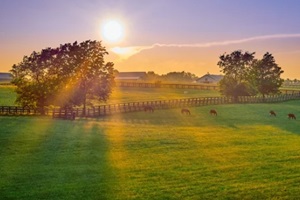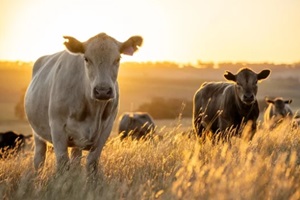 In the world of agriculture, farmers and ranchers face a unique set of risks. Successfully navigating these risks requires a thorough understanding of agricultural practices and business.
In the world of agriculture, farmers and ranchers face a unique set of risks. Successfully navigating these risks requires a thorough understanding of agricultural practices and business.
Through proper research, farm and ranch owners can explore essential strategies to navigate the complexities of liability and secure the appropriate farm and ranch insurance coverage to meet individual needs.
Understanding the Scope of Farm and Ranch Insurance
Farm and ranch insurance offers coverage against both commercial and personal risk. Compared to homeowner’s insurance, which typically covers one’s home and the contents inside, farm and ranch insurance offers a broader range of coverage to meet farmers’ liability and business needs.
At a basic level, farm and ranch insurance protects against natural disasters and personal expenses, including medical liability, theft, vandalism, and property damage.
Similarly, natural disasters such as lightning, hail, windstorms, and fires may cause damage to personal property. Because of these possible expenses, finding an insurance plan that covers the needs specific to farms is essential.
Types of Coverage: From Property Damage to Liability
The right insurance for a farmer typically includes the following as a baseline:
Farm Equipment Insurance
Farm equipment insurance protects agricultural equipment such as planters, combines, tractors, and sprayers. Under this insurance, equipment is protected against damage from natural disasters, theft, vandalism, collision, and accidental damage to another person or their property.
Personal Property Insurance
Under farm personal property insurance, homes and buildings on farm property are protected against natural disasters, fires and explosions, vehicle collisions, theft, and robbery.
Structures may include the house, guest/employee housing, barns, silos, and more. Farm equipment may fall under personal property insurance, but separate plans may be better depending on the situation.
Liability Insurance
Liability coverages are another important aspect of your risk management strategy. Liability insurance protects against accidental mistakes and injuries that may take place on a farm.
For example, liability insurance would cover their medical expenses if a guest were to be accidentally injured by a farm animal. Liability insurance also offers coverage against hazardous products from the farm.
For example, suppose that a bad batch of tomatoes causes a consumer to get sick. Comprehensive insurance would protect the farmer against legal liabilities and assist with the ill person’s medical expenses.
Customizing Your Insurance Policy: Tailoring to Your Farm’s Needs
Because each farm is unique, insurance plans can be customized to fit the needs of your situation best. Some custom options for further coverage include:
Livestock Coverage
 Blanket livestock coverage is offered under farm personal property insurance, but many insurance agencies also provide a more specific plan. Schedule livestock and cattle coverage allows the farmer to assign specific insurance amounts to individual animals. This is beneficial if a farm has animals with varying values.
Blanket livestock coverage is offered under farm personal property insurance, but many insurance agencies also provide a more specific plan. Schedule livestock and cattle coverage allows the farmer to assign specific insurance amounts to individual animals. This is beneficial if a farm has animals with varying values.
Replacement Coverage
Another optional coverage plan is replacement cost coverage for irrigation systems. Irrigation systems can be damaged in storms and fires, which can be detrimental to planted crops on the farm. This additional coverage would prevent out-of-pocket expenses for the costs of a new irrigation system if the old one were to be damaged.
Identifying Common Risks and Liabilities in Agriculture
In general, five common types of risk threaten a farmer’s business: finances, price or market, production, institutional, and personal risk.
Financial risk can come from debt, loans, restricted credit availability, and rising interest rates. Price and market risk can vary as products and market conditions change constantly; uncertainty about what consumers will pay for products will always be present.
Production risk results from factors that can negatively affect livestock and crops, such as bugs, bacteria, weather, or a poor growth season. Institutional risk refers to laws and regulations set by the government.
The government decides on animal treatment regulations and tax laws, which can heavily impact a farm. Personal risk includes events that could affect business on a farm.
Personal risks include business disagreements, divorce, death, accidents, or illnesses. Insurance policies can address many risks by providing a financial safeguard against rapid changes or out-of-pocket costs necessary to adapt to new requirements or equipment replacements.
Risk Assessment: Evaluating Your Farm’s Vulnerabilities
To prevent avoidable accidents, farmers should frequently assess their farms for risks. First, identify the hazards on the farm. A hazard, such as working with heavy machinery, electricity, or dangerous chemicals, could harm a person.
Once identified, farmers can assess the dangers and decide if precautions are necessary to increase safety. Installing gates and barriers, using low-impact chemicals, and encouraging check-ins with workers are all precautions that could increase safety on a farm.
Regular risk assessment decreases the likelihood of an unexpected accident and allows farmers to see where more liability coverage may be needed. It can also help to reduce insurance premiums, as agencies may view farms that proactively mitigate their risk through training, equipment repair, and proper worker treatment as less likely to file a claim.
Practical Steps to Choosing the Right Insurance Provider
 Each farm or ranch’s policies, exclusions, and insurance plans will vary. Because of this, it’s essential to choose an insurance provider knowledgeable about local agricultural practice rules.
Each farm or ranch’s policies, exclusions, and insurance plans will vary. Because of this, it’s essential to choose an insurance provider knowledgeable about local agricultural practice rules.
Farmers should seek a professional who regularly works in this niche and can effectively communicate the best protection for each farm area.
This will allow farmers better to understand their insurance plan options and potential coverage. Select an insurance agency with a quick response time and smooth communication to facilitate the process should you ever need to file a claim.
Secure Your Farm’s Future: Contact Burton & Company for Expert Farm and Ranch Insurance Guidance
Because agricultural practices are associated with challenging risks, thorough research is essential to understand how best to protect a farm or ranch.
Working with a knowledgeable insurance provider can equip farmers with industry-specific protection and ensure that money isn’t spent where it doesn’t need to be. Contact Burton & Company today to discuss the best-personalized plan for your farm.

